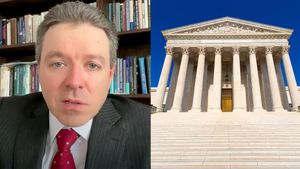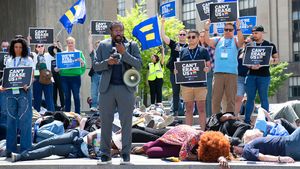It now seems so meh when Donald Trump, in a Hollywood sense, said he considered himself a “star.” And we all chuckled, nd then gasped. Trump felt being a “star’ gave him license to act like a lout. “And when you’re a star, they let you do it. You can do anything,” he loutishly bragged. You know by now,what that included.
Keep up with the latest in LGBTQ+ news and politics. Sign up for The Advocate's email newsletter.
That’s why, on the surface, Trump’s 100 percent tariff on foreign-made films might sound like another one of his bombastic and bumbling flourishes. To many, his proposal makes absolutely no sense. But beneath that bewilderment lies something far more insidious, and that’s his authoritarian bent to attempt to dictate cultural production, silence dissent, and isolate the American creative community from the world.
With this single tariff pronouncement, Trump is also reviving the chilling ghost of the Red Scare and placing himself in the long and dangerous tradition of strongmen who view the arts not as a mirror of society but as a weapon or, worse, a threat to their own fragile egos.
Trump’s justification for the tariff is paper-thin and unbelievable. He claims Hollywood is “dying” by overseas production incentives and foreign influence. But just like his false claims of widespread voter fraud, his unfounded assertions about crime and immigrants, and his egomaniacal claim he is a “star,” this is classic Trump, exalting himself while weaponizing fear to consolidate power.
This isn't about “saving” Hollywood. It’s about controlling it. And this falls squarely in line with Trump’s obsession to not only control the country, the world, and even the Catholic Church. See, the thing is, Trump has always had it out for Hollywood. He railed for years that the Emmy Awards were “rigged” becauseThe Apprentice, while he was its “star,” lost eight times in a row. Thus, the tariff game he’s now playing with Hollywood is part of his retribution tour.
Here’s why. The new tariff will make it more expensive for studios to film abroad or collaborate with international talent. While presented as a protectionist policy, the real consequence is creative isolation.
If you look at this closely, you can see how thoroughly prohibitive it could be, theoretically placing a financial chokehold on global cooperation in art, punishing American studios that seek cultural diversity or cost-efficient production overseas.
It’s also retaliation against an industry that has often opposed his policies and values, and one that he thinks is too liberal. And it fits an unsettling pattern.
Earlier this year, Trump took the unprecedented step of installing himself as chair of the Kennedy Center for the Performing Arts. Trump purged the board and replaced it with political loyalists, turning a venerable national arts institution into a partisan organ of his maniacal control. He is the antithesis of all the Kennedy family stands for, with one glaring exception, Robert F. Kennedy Jr.
At the same time, Trump’s targeted the National Endowment for the Arts with massive budget cuts and blatant executive overreach, seeking to ensure federal arts funding flows only to programming aligned with his administration’s ideology. Warpedly, that would include Kid Rock, Lee Greenwood, and bizarrely, the Village People.
And while we might laugh at the aforementioned “artists,” Trump’s arts strategy is all about efforts to consolidate, control, and conform, and is ripped from the autocrat’s playbook.
Authoritarian leaders throughout history, from Adolf Hitler and Joseph Stalin to modern day autocrats Miguel Díaz-Canel of Cuba, Vladimir Putin, Xi Jinping, and Turkey’s Recep Tayyip Erdoğan, have treated independent artists as dangerous dissidents.
For example, in 2013 the world was shocked when Putin imprisoned punk band Pussy Riot for protesting against his regime. In Turkey, hundreds of artists have been arrested for “terror propaganda.” And in China, Ai Weiwei was detained and surveilled for his outspoken art.
What all these regimes and despots have in common is their deep fear of the arts. Why? Because art tells the unabashed truth. It breaks through carefully controlled propaganda. It moves hearts and minds in ways that no press release, protest, or brainwashing (read: repeated and repulsive Truth Social posts) ever could. Art is powerful, meaningful, and extraordinarily visceral.
And Trump knows this. That’s why his administration, in its first four months, has declared war on the arts.
It’s hard not to see the historical echoes here. In the 1950s, the U.S. government unleashed McCarthyism, a cultural purge under the guise of anti-communism, under the despicable leadership of Republican Sen. Joseph McCarthy of Wisconsin.
Even before McCarthy's rise to power, artists, screenwriters, and actors were dragged before the House Un-American Activities Committee and asked, “Are you now or have you ever been a member of the Communist Party?” Careers were destroyed. Hundreds were blacklisted. Masterpieces were never made. Then McCarthy, in the 1950s, targeted not only Hollywood but the State Department, the White House, and even the U.S. Army, alleging communist infiltration in all these institutions.
That chapter in American history was a shameful descent into paranoia and repression. We are now watching its sequel under the equally despicable Trump. And we’re asking the same question of Trump that was directed at McCarthy: “Have you no sense of decency?”
Trump’s tariff creates a de facto blacklist on international collaboration. It punishes the “globalist” art Trump has long sneered at, preferring instead a sanitized, jingoistic aesthetic like Greenwood’s “God Bless the USA,” otherwise known as the anthem of white Christian nationalists.
Trump has framed his tariff as a “security issue,” as if a French indie film or a co-production with an ally like South Korea poses a threat to the American people.
But the true threat he sees is political. International cinema tends to be progressive, diverse, and complex, exactly the things Trump and his allies loathe. What better way to sanitize American culture than to wall it off from the rest of the world?
When artists cannot create freely, democracy suffers. When artists are silenced, a society loses more than song, story, or spectacle. It loses its ability to imagine, to dissent, to dream aloud. History shows that authoritarianism rarely begins with tanks in the streets. Rather, it begins with the quiet closing of theater doors, the erasure of subversive artwork, or the censorship of songs like the ones that spooked Putin.
The arts are often the canaries in the coal mine of authoritarianism. They are the first to feel the chill because they are the freest expression of who we are, and who we might become. When that freedom is stifled, it signals a deeper rot in the democratic foundation.
A wannabe authoritarian leader like Trump cannot tolerate dissident artists, which inevitably means he can’t tolerate his citizens either. To defend the arts, then, is not a luxury and not something left to the entitled. It is literally an act of preservation, of both liberty and truth, things Trump would never appreciate or understand, like a foreign film.
Voices is dedicated to featuring a wide range of inspiring personal stories and impactful opinions from the LGBTQ+ community and its allies. Visit Advocate.com/submit to learn more about submission guidelines. Views expressed in Voices stories are those of the guest writers, columnists, and editors, and do not directly represent the views of The Advocate or our parent company, equalpride.














































































